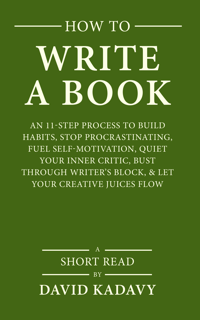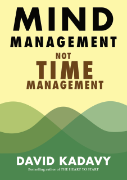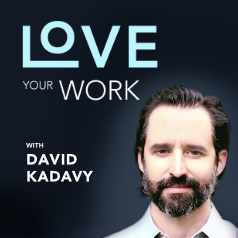Subscribe to blog updates via email »
E.R.A.S.E. F.E.A.R. and Finish Your Creative Projects – Love Your Work, Episode 281
 In fifteen years as a self-employed creator, I’ve learned how to finish what matters. I follow a nine-step process that makes an easy-to-remember acronym, that also describes what this process does: E.R.A.S.E. F.E.A.R.
In fifteen years as a self-employed creator, I’ve learned how to finish what matters. I follow a nine-step process that makes an easy-to-remember acronym, that also describes what this process does: E.R.A.S.E. F.E.A.R. Listen to the Podcast
- Listen in iTunes >>
- Download as an MP3 by right-clicking here and choosing “save as.”
- RSS feed for Love Your Work
Fear is Resistance
Fear is at the root of most struggles to finish creative projects. Even when you think you’re merely getting interested in another project, that’s often fear masquerading as curiosity. Steven Pressfield calls it Resistance. It can cause the dreaded shiny object syndrome. But if you can break down most of the sources of fear, you can clear the way for decisive action. You can erase fear.The E.R.A.S.E. F.E.A.R process
First, what does “erase fear” stand for?- Envision the outcome
- Rehearse the process
- Ask questions
- Search for answers
- Enjoy the process
- Face the obstacles
- End perfectionism
- Assess the outcome
- Record the process
2. Rehearse the process. Once you have a vision, mentally rehearse the steps. Do you have any idea what steps to follow to make this vision a reality? I want “Goldilocks” fear in my projects. If you know exactly what to do, it won’t be fun. If you don’t know where to begin, you’ll be paralyzed. You want just the right amount of fear, to keep it interesting. If you’re too familiar with the process, ask yourself, How can you scale up your vision? If you’re too unfamiliar, ask yourself, How can you scale it down?
3. Ask questions about the gaps in your knowledge. Now you have a vision that challenges you just the right amount. There are parts of the process you don’t understand. These unknowns can be sources of fear: They could turn out to be way more complicated than you expected, which would put in jeopardy your ability to follow through. Write down the questions you have about the process.
4. Search for answers. Look at your questions about the process. Set aside time and energy to answer them. You can make a surprising amount of progress just guessing. Before you ask anyone else, ask yourself, How would I do this? You might find a new way of doing things. If too much is unknown, you may have to scale back your vision once again. If it’s all too easy, you may need to scale it up. But don’t get frustrated if you don’t find all the answers. You’ll learn them in the next step.
5. Enjoy the process. You’ve planned and worked to pick the right project. But you can’t go into it without some unknowns. Otherwise, by definition, it wouldn’t be a creative project. You’ll find the rest of the answers to your questions in the act of doing. This is where you need to do a little mental wrestling. Whatever fear you have, flip it over and slam it on its back. Turn that fear into excitement about discovery. If you’ve done the first four steps well, picking the right-sized project with the right amount of uncertainty, you’ll be able to pull this off.
6. Face the obstacles. As hard as you try to take on a project you can handle, you’re going to run into obstacles. Fear often manifests itself as convenient excuses. The most dangerous excuses are the true ones. Yes, your project hasn’t gone as planned or a bomb went off in your personal life, but that doesn’t mean this is impossible. Slaughter your scapegoats and move forward. Anything worth doing requires some grit.
7. End perfectionism. You’re nearing the end of your project. In fact, you could ship it right now. That is, if it weren’t for perfectionism. Perfectionism can turn the final five percent of a project into a hundred-five percent. Just when you put on one “final touch”, you notice another that needs to be improved. Part of this is due to the Finisher’s Paradox, which I talked about on episode 267: You learn in the process of a project, so by the end, you can already do better. Another part of it is fear. Fear makes you anxious. When you’re anxious, you notice imperfections. Some of those imperfections are figments of your imagination. You’ve done all you can up to this point to erase fear, but there’s still going to be some in the final stretch. Know perfectionism is there, and push through to ship. Like I talked about on episode 265, shipping is a skill.
8. Assess the outcome. Even though we’re done with the project, we’re not done erasing fear. Now that your project is out in the world, ask yourself, How did it turn out? Look back on the vision you wrote down, and your predictions about success. Does it fit that vision, and if not, why? What did you not foresee? What would you do differently next time? Write it down.
9. Record the process. Reflect on the actual process you followed. Write it down, and brainstorm how you might do it better next time. You now have a process you can follow, even if it’s just a Sloppy Operating Procedure, like I talked about on episode 224. Preparation is the antidote to fear. The next time you do a project like this, you can do it a little bigger, so you add a few unknowns to the new process that keep it interesting.
Go forth and erase fear
This process is exactly how I erase fear in my projects, whether it’s in the three books I’ve written, or more than 280 podcast episodes. I hope it works for you, too. Image: Broadway Boogie Woogie, by Piet MondrianJoin the Patreon for (new) bonus content!
I've been adding lots of new content to Patreon. Join the Patreon »
Subscribe to Love Your Work
Listen to the Podcast
- Listen in iTunes >>
- Download as an MP3 by right-clicking here and choosing “save as.”
- RSS feed for Love Your Work
Theme music: Dorena “At Sea”, from the album About Everything And More. By Arrangement with Deep Elm Records. Listen on Spotify »



